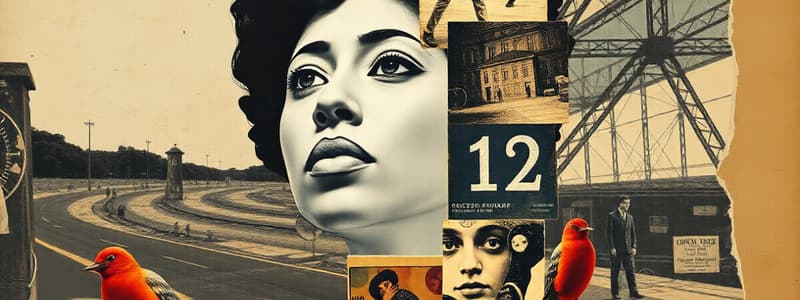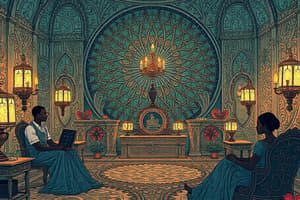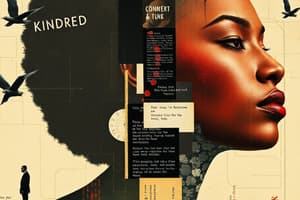Podcast
Questions and Answers
Match the following issues discussed in the exam content with their descriptions:
Match the following issues discussed in the exam content with their descriptions:
Anthropogenic climate change = Drought and sea-level rise Pervasive homelessness = Widespread lack of housing Drug addiction crisis = Unraveling of social contract Disparities of wealth = Gated enclaves and shanty-towns
What year did Octavia Butler envision neighborhood life in her fiction?
What year did Octavia Butler envision neighborhood life in her fiction?
- 1993 (correct)
- 2024
- 1990
- 2020
What are students expected to write in their essay for the final exam?
What are students expected to write in their essay for the final exam?
A 5-paragraph essay
What does the ocean impart according to the content?
What does the ocean impart according to the content?
The communities passed by the travelers were described as thriving and prosperous.
The communities passed by the travelers were described as thriving and prosperous.
What is referred to as the 'royal highway of California’s Spanish past'?
What is referred to as the 'royal highway of California’s Spanish past'?
The concept of 'sabbath-structure' provides a heightened sweetness of an intermittent pause in a context of exhausting _____ and hyper-vigilance.
The concept of 'sabbath-structure' provides a heightened sweetness of an intermittent pause in a context of exhausting _____ and hyper-vigilance.
Match the following descriptions with their corresponding concepts:
Match the following descriptions with their corresponding concepts:
What is the purpose of parables according to the given content?
What is the purpose of parables according to the given content?
The parable of the sower suggests that everyone who hears the word will be fruitful.
The parable of the sower suggests that everyone who hears the word will be fruitful.
What metaphor does the speaker use to refer to their work in relation to Earthseed?
What metaphor does the speaker use to refer to their work in relation to Earthseed?
The parables serve as _______ language that speaks to some and not others.
The parables serve as _______ language that speaks to some and not others.
Match the following types of ground with their respective outcomes in the parable of the sower:
Match the following types of ground with their respective outcomes in the parable of the sower:
In the context of the parable, who does the speaker imply will struggle to understand the word?
In the context of the parable, who does the speaker imply will struggle to understand the word?
The author expresses complete satisfaction with their writing abilities.
The author expresses complete satisfaction with their writing abilities.
What does the author wish regarding their messages and the concept of God?
What does the author wish regarding their messages and the concept of God?
The phrase 'He that hath ears to hear, let him ______.'
The phrase 'He that hath ears to hear, let him ______.'
What kinds of distractions are noted to impact the reception of the word?
What kinds of distractions are noted to impact the reception of the word?
What was Zahra sold by her mother to?
What was Zahra sold by her mother to?
The concept of change is portrayed as entirely negative in the discussion.
The concept of change is portrayed as entirely negative in the discussion.
What historical event was referenced to illustrate change in society?
What historical event was referenced to illustrate change in society?
Change during a collapse is described as both __________ and potentially generative.
Change during a collapse is described as both __________ and potentially generative.
Match the following concepts with their descriptions:
Match the following concepts with their descriptions:
According to the discussion, what realization did survivors of the plague come to?
According to the discussion, what realization did survivors of the plague come to?
Lauren believes that some changes in a collapsing world are beneficial.
Lauren believes that some changes in a collapsing world are beneficial.
What does Bankole discuss with Lauren regarding the future?
What does Bankole discuss with Lauren regarding the future?
The discussion about the bubonic plague suggests that it took a __________ to make people realize that things could change.
The discussion about the bubonic plague suggests that it took a __________ to make people realize that things could change.
What does the phrase 'what light is glimpsed through the cracks of a crumbling civilization' imply?
What does the phrase 'what light is glimpsed through the cracks of a crumbling civilization' imply?
What does the character believe about Donner's significance?
What does the character believe about Donner's significance?
The character takes great pleasure in seeing the suffering of others.
The character takes great pleasure in seeing the suffering of others.
What is hyperempathy syndrome?
What is hyperempathy syndrome?
The character's father believes that he can ______ his hyperempathy syndrome.
The character's father believes that he can ______ his hyperempathy syndrome.
Which of the following best describes the street poor as portrayed in the text?
Which of the following best describes the street poor as portrayed in the text?
The character feels no connection to other people’s suffering due to hyperempathy syndrome.
The character feels no connection to other people’s suffering due to hyperempathy syndrome.
What internal conflict does the character face regarding their feelings towards Keith?
What internal conflict does the character face regarding their feelings towards Keith?
If hyperempathy syndrome were more common, people would be less likely to ______ each other.
If hyperempathy syndrome were more common, people would be less likely to ______ each other.
Match the terms with their descriptions:
Match the terms with their descriptions:
What does the character try to avoid while riding?
What does the character try to avoid while riding?
Flashcards
World-building
World-building
The process of creating a detailed and believable fictional world, including its setting, culture, history, and rules.
The Future is Now
The Future is Now
A term coined by Octavia Butler, it refers to the idea that the future is not predetermined, but rather shaped by current actions and choices.
Anthropogenic Climate Change
Anthropogenic Climate Change
The significant changes in weather patterns, including rising sea levels and extreme droughts, caused primarily by human activities.
Pervasive Homelessness
Pervasive Homelessness
Signup and view all the flashcards
Disparities of Wealth and Poverty
Disparities of Wealth and Poverty
Signup and view all the flashcards
Social Contract & Familial Fabric
Social Contract & Familial Fabric
Signup and view all the flashcards
Refugee/Immigration Crisis
Refugee/Immigration Crisis
Signup and view all the flashcards
Parable
Parable
Signup and view all the flashcards
Given to Know the Mystery
Given to Know the Mystery
Signup and view all the flashcards
Those Without
Those Without
Signup and view all the flashcards
Satan Taking the Word
Satan Taking the Word
Signup and view all the flashcards
Sown on Stony Ground
Sown on Stony Ground
Signup and view all the flashcards
Choking Thorns
Choking Thorns
Signup and view all the flashcards
Sown on Good Ground
Sown on Good Ground
Signup and view all the flashcards
Earthseed Verses: Discovery vs Invention
Earthseed Verses: Discovery vs Invention
Signup and view all the flashcards
Striving for Authenticity
Striving for Authenticity
Signup and view all the flashcards
Hyperempathy Syndrome
Hyperempathy Syndrome
Signup and view all the flashcards
Human Bannister
Human Bannister
Signup and view all the flashcards
Inuring Against Suffering
Inuring Against Suffering
Signup and view all the flashcards
De-sensitization
De-sensitization
Signup and view all the flashcards
Hypo-empathy Syndrome
Hypo-empathy Syndrome
Signup and view all the flashcards
Kill Without Pain
Kill Without Pain
Signup and view all the flashcards
Universal Empathy & Violence
Universal Empathy & Violence
Signup and view all the flashcards
Hyperempathy & Functioning
Hyperempathy & Functioning
Signup and view all the flashcards
Avoiding Suffering
Avoiding Suffering
Signup and view all the flashcards
Internal Struggle of Hyperempathy
Internal Struggle of Hyperempathy
Signup and view all the flashcards
Privilege of Fearing Future Catastrophe
Privilege of Fearing Future Catastrophe
Signup and view all the flashcards
Orbis Hypothesis
Orbis Hypothesis
Signup and view all the flashcards
Dystopian/Utopian Cusp
Dystopian/Utopian Cusp
Signup and view all the flashcards
Patching the Walls
Patching the Walls
Signup and view all the flashcards
Changes Caused by a Plague
Changes Caused by a Plague
Signup and view all the flashcards
Light Through the Cracks
Light Through the Cracks
Signup and view all the flashcards
Heterogeneous Description of Collapse
Heterogeneous Description of Collapse
Signup and view all the flashcards
Earthseed
Earthseed
Signup and view all the flashcards
Generative Change
Generative Change
Signup and view all the flashcards
Retrograde Fantasies
Retrograde Fantasies
Signup and view all the flashcards
Sabbath by/with the Water
Sabbath by/with the Water
Signup and view all the flashcards
Entwinement of Human & Environmental Causation
Entwinement of Human & Environmental Causation
Signup and view all the flashcards
Disasters & Social Disintegration
Disasters & Social Disintegration
Signup and view all the flashcards
Oasis of Time
Oasis of Time
Signup and view all the flashcards
Settlement of Acorn
Settlement of Acorn
Signup and view all the flashcards
Study Notes
Final Exam Format
- Passage Identification (5): Requires identifying the author and title of the source text.
- Keywords (3): Defining key concepts from class, examples include "wilderness dualism".
- Short Answers (5): Simple questions about concepts and texts. Some may be multiple choice.
- Long Answers (2): Writing paragraphs in response to questions about course texts.
- Essay (1): Choosing one of three essay prompts and writing a 5-paragraph essay. Key passages will be supplied for each prompt.
- Scope: Only texts and concepts discussed in class will be tested; not every text on the syllabus.
- Choices: Multiple-choice questions and essay prompts are offered for exam sections.
- Materials: Blue books, own pen/pencil, no mobile devices, books, or papers permitted.
Speculative Fiction and Octavia Butler
- World-building: Speculative fiction involves constructing detailed, immersive, and plausible settings.
- Butler's Vision: Described through details and examples that emphasize neighborhood life in the 2020's, the fictional world, the relationship between this fictional depiction and reality in 2024, and factors contributing to the knowability/predictability in 1993.
Dystopian Novel's Content Summary 2024
- Author's Perspective: "A Conversation with Octavia E. Butler", (343) where the author reflects on their present situation, current behaviours and potential future issues.
- Themes:
- Climate change (drought, sea-level rise, homelessness)
- Refugee/immigration crises
- Extreme social inequalities (wealth, poverty, securitization of urban spaces)
- Drug crisis and collapse of societal structures
- Political discourse ("returning to normalcy", or "good old days")
- Patriarchy, racism, and authoritarianism
- Corporate power and privatization of public resources
- Debt slavery, trafficking, enslavement, and collapse in public education and infrastructure.
- Threat of FIRE (likely a colloquialism for financial, investment, and environmental disaster)
- Context: The novel's dystopian vision is set in the 2020's.
Novel's Dystopian Structures and Elements
-
Structure and Metafiction: The book uses journal entries, first-person narration, "Verses", and excerpts. Lauren is a writer constructing the text.
-
Purpose of Fiction: Fiction can be useful for survival and understanding the present and preparing for the future
-
Naming: Giving names can help to understand concepts and to create a sense of familiarity and control
Earthseed, Metafiction, and Meaning
- Earthseed: A named belief system. It is a fictional belief system that is the subject of discussion in the text.
- Human intervention: The author considers human impact, role in ecosystems, and the importance of the environment.
- Planet Propagation: Metaphor of Earthseed, used symbolically to represent life, growth and dissemination.
- Purpose/effect: The study asks what is the meaning or purpose of using plant/planetary propagation as a metaphor in the book.
Utopia and Outer Space, Manifest Destiny
- Destiny of Earthseed: To take root among the stars
- Godseed: Humans are Godseed by nature.
- Purpose and meaning related to Utopia and outer space: This part is to determine the author's ideas regarding Utopia and Outer space, and the author's views on Manifest Destiny.
Naming and Meta-parables, Seed Theory
- God-is-Change: A specific belief system that is used to analyze various concepts and ideas, with additional elements like naming, metaphor selection, meaning behind them, and their purpose. Naming is used as part of this process.
- The Word (of God): This is the topic of discussion about the Word as the subject of the parable and other related concepts.
- Sower's Metaphor: The meaning/purpose and effect related to the use of the metaphor of the sower, and the word of God is to be analyzed.
Unchosen Eco-anarchism
- Mutual Aid: Cooperation, self-determination, and forms of assistance to overcome a dysfunctional state. The Unchosen community embodies values of mutual aid rather than reliance on centrally controlled institutions, like a state, or capitalism.
- Provisions: The community provides food, shelter, education, safety, and disaster relief.
- Community Values: Cooperation, shared responsibility, and mutual aid are key, as opposed to the state-controlled systems of traditional governance (political economy and political discourse).
Mutual Aid, Cooperative Evolution/Evolution
- Cooperative Evolution: Humanity's collective efforts lead to positive change and adaptations.
- Intelligence and Adaptation: The author considers the influence of intelligence and adaptation in terms of group evolution and change
- Force of Habit/Habit as Force: The study asks about the concept of habit acting as a strong agent for positive adaptations in life, and in society.
Apocalypse vs. Collapse
- Generational Conflicts: The conflicts and differences between the older and younger generations, and the struggle to adapt to new circumstances.
- Adaptation: The resilience shown by older generations due to different historical backgrounds and their experience of change and loss.
Whose Worlds Have Ended, Parables
- World's Collapse: The analysis of the conditions that lead to a collapse of the world.
- Retrograde Fantasies: The study examines whether denying reality, and clinging to past illusions, hurts the individuals and/or communities.
- Dystopian/Utopian Cues: A study of the duality of these concepts using the text as a reference.
- Generational Conflict and Responsibility: The analysis considers how to analyze generational conflict, and the responsibilities of the current generation regarding the past and future, and who might be accountable due to past or present circumstances.
Hyperempathy and Consequences
- Biological Conscience: Understanding how hyperempathy potentially creates or manifests as a “biological conscience”
- Violence: The analysis also focuses on the subject of interpersonal/interpersonal violence using text as a reference, and to what extent hyperempathy acts as a mitigating factor.
- Shared Experiences: The sharing of past experiences through narration to create empathy.
- De-sensitization: How hyperempathy is potentially de-sensitizing and mitigating the impact of everyday violence.
On the Road, Catastrophe, Dystopia
- Simplicity, Luxury, Beauty, and Hope: The study explores themes of simplicity and appreciation/embracing of beauty in the face of catastrophe, dystopian ideas and hope.
- Comfort, Laziness, Knowing, Rest: These concepts are analyzed in terms of their effect on the community and on those who are on the road in search of safety and security, as well as to appreciate or analyze their emotional states related to their circumstances.
- Pacific Ocean: How the ocean's effect and impact are related to the themes of the study.
- Sabbath-structure: Provides rest, recreation and a sense of heightened peacefulness.
Acorn, Community, and Rituals
- Community Values: The emphasis placed on the values of community and the practical implications of life in a community, and the values emphasized in the community context.
- Organised Time: The significance and effect of the organization of time on the community.
- Rituals and Commemorations: Rituals for life commemoration (e.g., weekly “Bible Study”).
Earthseed Theology
- God Concept: The analysis considers different views of God.
- God is Change: This philosophical concept will be referenced.
- Worship and Perception: To what extent does worship, and how we perceive God, influence human behaviour and society.
- Action and Service: How does the author present the importance of human agency/action and service.
Final Quiz/Reflection Questions
- What is a sticking point from the novel?
- What questions or lessons do you takeaway from this novel?
- One Short Verse (like Earthseed): Formulate a verse or quote to describe the takeaways from the specific novel in question. (a creative and engaging method of reflection and expression).
Studying That Suits You
Use AI to generate personalized quizzes and flashcards to suit your learning preferences.




